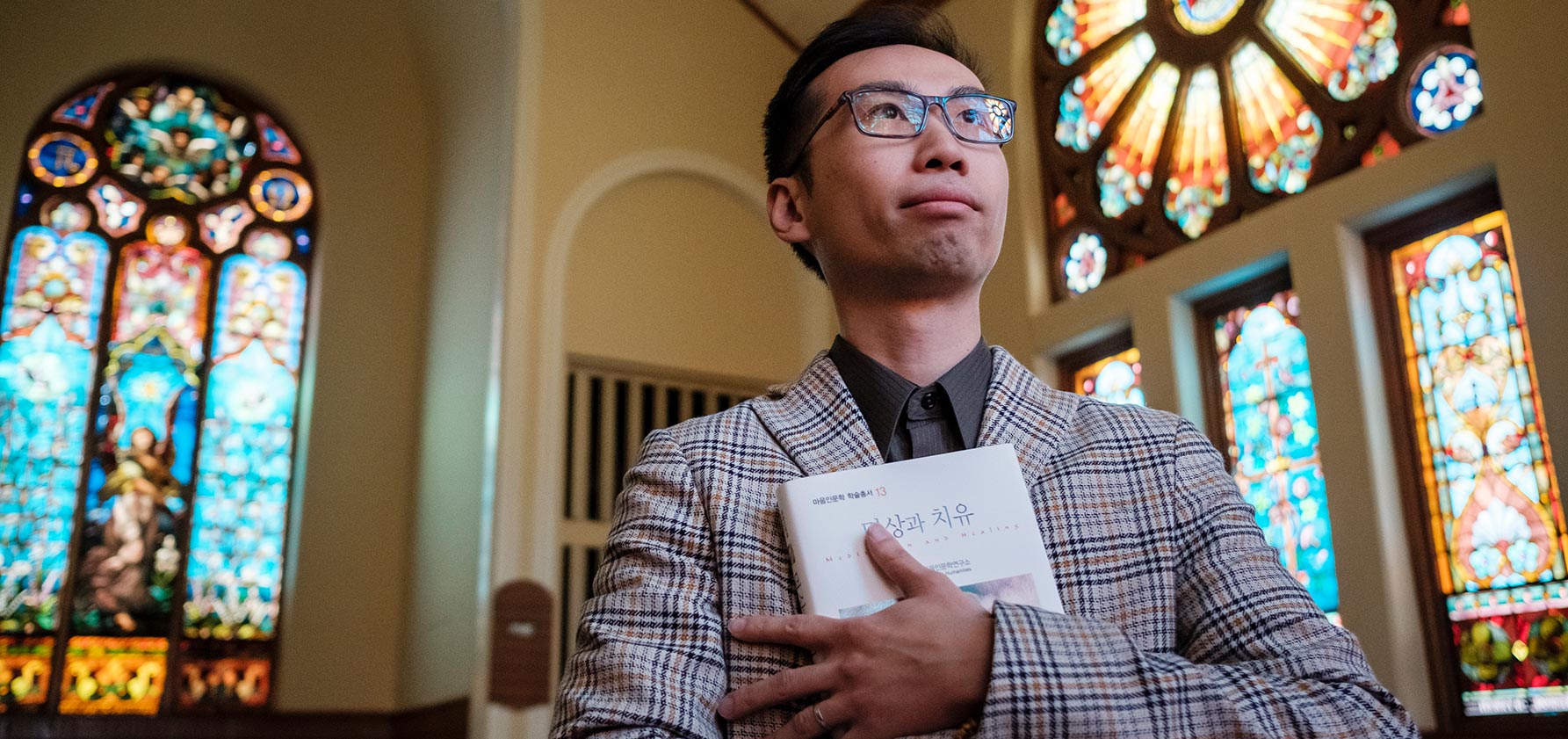
Where did you grow up?
Brooklyn, New York.
What are your research interests, and why are you drawn to them?
I research contemporary Buddhism, including practical implications of Buddhist ethics, the scientific study of Buddhist-based meditation, the relationship between Buddhism and mindfulness, Buddhism and healing, and Chinese Buddhist institutions’ involvement in the stock market. I was drawn to the stories about wacky Zen teachers in high school but never realized the philosophical depth of Buddhism until a college course during my senior year. This led to graduate work on a philosophical and religious-studies response to the scientific study of Buddhist-based meditation.
I am fascinated by the complexity of rich philosophical-religious traditions like Buddhism because of how people use religion. Recently, I presented at a national conference on two new books in the field. One of them explains how American psychiatrists have more than six different approaches they use to engage with Buddhist-based practices, including mindfulness, in their therapeutic repertoire. The other book explains that the booming interest in mindfulness has roots in the American mind-cure movement of the late 19th century. The conference discussion covered how religious institutions often present a neat hierarchical structure and clear boundaries between categories, yet religious agents blur these distinctions all the time. For example, the founder of Mindfulness-Based Stress Reduction (MBSR) touts that his eight-week program is based on the Dharma (teachings/truth/law) of an ancient wisdom tradition. At the same time, he claims MBSR is fully secular when applying for scientific research funding in order to gain legitimation of this program. This hides the fact that MBSR training manuals state that in order for teachers of such programs to complete their training, they must undergo religious meditation retreats of at least five days. It may be tempting to write this off as a case of simple hypocrisy. The better explanation is that, like other religious actors, he is constantly actively constructing and reinterpreting the relationship between the religious and secular.
What is your favorite class to teach and why?
At the moment, Asian Traditions Through Film. We analyze eight feature-length films, numerous short films, and clips over the course of a semester. Students learn two things: Asian religious-philosophical traditions and the art of filmmaking. The course culminates with students screening the short films they produced for their final project. It’s a pleasure to see students start out intimidated by the prospect of creating a film, but then over the course of screenplay writing, storyboarding, and learning technical skills of framing, shooting, and editing, end up with an artistic creation they are proud to show their classmates.
Share something about yourself that people may not know.
I was on my high school bowling team. My highest score is 257.
What is your favorite spot on campus?
The library, because searching for books in the stacks leads to discovery of books I didn’t know I was interested in. The problem with internet searches is the search engine decides what information you want based on the terms you supply. This does not allow discovery of information in the same way that libraries offer.
What is your favorite off-campus activity?
Going to museums. There are fantastic art and natural history museums in New York City and Philadelphia not far from where I currently live in central New Jersey. I took an acting class as an undergraduate, and my acting professor says the best way to get into character is through people-watching. Museums are public spaces for education and art appreciation that also provide excellent opportunities to observe people. Spend 10 minutes in New York’s Museum of Modern Art and you’ll see what I mean.
What is your favorite book?
Michael Crichton’s Sphere. Crichton was a master of suspense. He was able to tell a compelling story about our battles with our subconscious while weaving in carefully researched scientific knowledge.
I can never resist a good ________.
Short film.
Who is your hero?
Kim Ki-duk studied fine arts in Paris and spent time as a painter on the streets of Europe until he turned to a very different career for which he had no professional training—filmmaking. He is now a prolific screenplay writer and director, making some of the best films I’ve ever seen precisely because he was an outsider to the profession. I admire his talent and courage to channel his creative energies into a new field.
What is the best advice you have ever received?
Mary Schmich wrote a column for the Chicago Tribune titled “Advice, Like Youth, Probably Just Wasted on the Young,” which formed the basis for a 1999 song by Baz Luhrmann called “Everybody’s Free (To Wear Sunscreen).” One line really resonated with me: “Don’t waste your time on jealousy. Sometimes you’re ahead, sometimes you’re behind. The race is long and, in the end, it’s only with yourself.” I interpret this as a call to take other people’s success as models for self-development. Rather than striving to run ahead of the pack, one may be most fulfilled by helping everyone else in the marathon of life.
What makes you happy?
A vigorous conversation with close friends over a delicious meal.